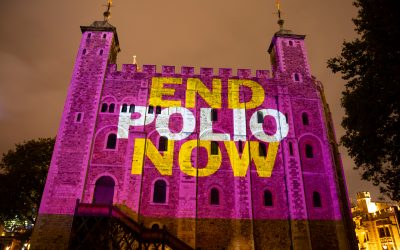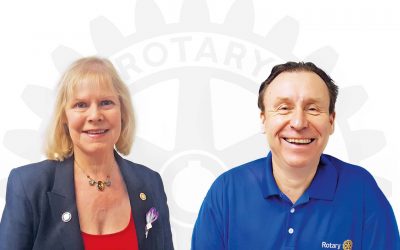Q | Why was the environment one of the key issues during your term as Rotary International President?
I have been a life-long environmentalist and noted that the environment had received relatively little emphasis from Rotary leadership in the past. The notable exception was President Paulo Costa from Brazil in 1990-91, one of my true Rotary heroes, who introduced the Preserve Planet Earth programme. Therefore, when thinking about what to emphasise when I was President, it seemed to me that it was a perfect opportunity to increase Rotary’s involvement with projects in support of the environment. Also, I think it is fair to say that concern about the environment had increased within the worldwide community in recent years, including in Rotary. It is a cause whose time has come.
Listen to this article
Q | What was the thinking behind the tree planting project, and how successful was it?
I wanted something that every Rotary club could do easily and would want to do. After all, doesn’t everyone love trees? A few Rotarians later told me that they thought I could have been more ambitious with the project, and they may be correct, but I preferred to ask for something that would be overwhelmingly endorsed by the Rotary world, which it was, and that would demonstrate that Rotary was interested in and concerned for the environment yet this simple concept would not be so all-consuming that it would take too much effort and emphasis away from all the other great Rotary programmes. The target was planting 1.2 million trees, one per Rotarian, and we understand that the final total for the year was somewhere between 3.5 and 4 million trees planted, which is great. Further, many Rotary clubs and districts have continued planting trees in the years after 2017-18, which is an ongoing benefit for the environment. As an example, a Bangladesh district has committed to planting one million trees in the current Rotary year and they are already well on the way to achieving that goal.
Rotarians are people of action and we are committed to the following science and promoting solutions to the causes and effects of climate change.”
Q | What are your thoughts on climate change?
Climate change is clearly one of the most significant challenges facing the world today. I believe most people agree with that, even if a small number are unclear about the cause of the problem. It is hard to argue with the scientific facts, which show that our climate is heating at an accelerating rate. In my part of the world, we have had fires, floods and storms at an unprecedented level in recent years, and that is replicated right around the planet. This level of degradation of our planet is not sustainable, and cohesive action is needed.
Q | The environment is Rotary’s seventh Area of Focus, but where does climate change fit into that?
Each of the Rotary Areas of Focus has a policy statement that shows what the Trustees and Directors agree could be covered by project work in that area, and also what is not covered. For the environmental policy statement, there are eight major categories, and one of them is “Addressing the causes of climate change and climate disruption, and supporting solutions to reduce the emission of greenhouse gases”. Under that subject heading, reference is made to renewable energy, clean-cooking technologies and transportation.
Our Rotary Foundation is a significant philanthropic organisation, and people notice when we address the problems of the world, within our Areas of Focus. “
Q | Some Rotarians believe climate change is political and Rotary should not be involved. What are your thoughts?
I certainly agree that Rotary should not be involved in partisan politics, and I am proud of the apolitical nature of our great organisation. My response to this argument is and has always been “what makes it political?” We are allowed to disagree on issues, but that doesn’t make them political. Possibly contentious but not political. One way of shutting down discussion is to state that the issue is political and therefore declare that we can’t be involved in it. Surely the problems resulting from a changing climate can be addressed by those Rotary clubs and districts who want to be involved, without causing dissent. After all, it’s not compulsory!
Q | What can Rotary do as an organisation to protect the environment?
In the same way, we are eradicating polio, Rotary is demonstrating by our actions that care for the environment is important. Because we are leaders in our communities and globally, our project work guides and inspires others to also take action. Our Rotary Foundation is a significant philanthropic organisation, and people notice when we address the problems of the world, within our Areas of Focus. Of course, this all depends on the projects that are undertaken by Rotary clubs and districts, which are the powerhouse of Rotary. Our new Area of Focus simply provides them with the opportunity to do even more.
Q | What would your message be to Rotarians around the world about climate change?
This is, as part of our new seventh Area of Focus, a way that Rotarians can make a difference in their communities and around the world. Rotarians are people of action and we are committed to the following science and promoting solutions to the causes and effects of climate change. Along with our other Areas of Focus, we are undertaking projects in the environment to make the world a better place


























































